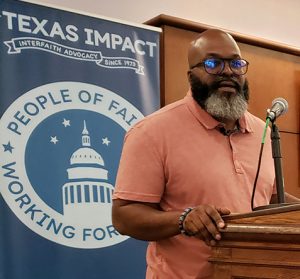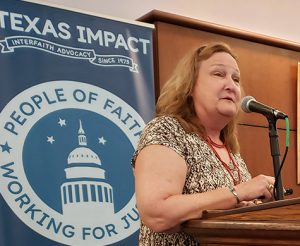“Everybody talks about the weather, but nobody does anything about it,” says a familiar adage.
The longtime saying is getting a new, more urgent interpretation from United Methodists, who are acting to create more sustainable futures in the wake of this summer’s extreme weather events.
The most recent reinterpretation of the old weather saying came July 15-16 from two keynote speakers at a conference held at Lovers Lane United Methodist Church in Dallas.
The event, which took place online and in person amid 100-plus-degree heat, was co-sponsored by Texas Interfaith Power and Light and the City of Dallas Office of Environmental Quality and Sustainability. Texas Interfaith Power and Light is affiliated with Texas IMPACT, an interfaith public policy education and advocacy organization whose members include five Texas-based United Methodist regional conferences, United Women in Faith (formerly United Methodist Women), and the Methodist Federation for Social Action.

Michael Malcom
People of faith should advocate for a three-pronged approach to the climate crisis that has so intensified this summer’s weather, said Michael Malcom, executive director of both Alabama Interfaith Power and Light and The People’s Justice Council, a nonprofit organization focused on theology and climate justice he founded in 2017.
Those three prongs are environmental restoration, economic restoration and ecumenical restoration.
A focus on resiliency often misses the point and leads people to avoid necessary environmental restoration, he said. “We oftentimes celebrate folks’ resilience as in ‘they weathered the storm.’ Is it really right that we celebrate someone’s resilience when we can do something about it?
“We don’t need any more ‘resilience,’ because that means we’ll continue to suffer disasters.”
“We don’t need any more ‘resilience,’ because that means we’ll continue to suffer disasters,” he said. “Instead, we need to be advocating to stop burning the fossil fuels that are causing this heat.”
Biblical principles should lead toward economic restoration, he added. “There was a time when people had everything they needed. Instead of leaving the edges of the fields to be gleaned by those who needed it as Boaz did (Ruth 2:7-23), we’ve warehoused wealth. We’ve got to get ourselves back to a system that ensures that none go without.”
Malcom described ecumenical restoration as the need to “restore faith — not as society has dictated it, but in the way our Scriptures dictate.”
He explained: “Look at the founding of the church. When fear rose, they gathered together, and Jesus came in (John 20:19-23). Look at where we are; fear has arisen. How do we restore faith, not only in our churches but in each other? We work together and use our voices to speak up against the ills that are happening in society. We use our voices collectively to speak up in prophetic utterance that this is not the way that God intended.”

Susan Alvarez
Susan Alvarez, a professional engineer who serves as assistant director of the Dallas Office of Environmental Quality and Sustainability, echoed Malcom’s theme of faith-based advocacy’s importance. She said that citizens’ activism spurred the creation of Dallas’ environmental plan.
“Local governments do listen to you,” she assured the gathering.
Dallas now has an Environmental Commission made up of 15 volunteers — one for each of its 14 City Council districts plus an at-large representative for the mayor — who regularly review public and private projects for compliance with Dallas’ Comprehensive Environmental and Climate Action Plan. The commission is aided by a non-voting group of professional experts in the plan’s focus areas such as water, waste, transportation and air quality.
Now the environmental office consults monthly with all city departments regarding their progress on achieving CECAP’s goals, Alvarez said. In addition, the environmental office works with regional governments and citizen partners such as the developers of a new municipal convention center, who have pledged the project will be “net-zero carbon emissions.”
Malcom also stressed collaboration in saving “people and planet” from disaster.
“The only way we break down this system of corruption, these wages of sin, is through community and collaboration,” he said. “The only way we’ll get through this is together.”
Note: The quote “everybody talks about the weather, but nobody does anything about it” is usually attributed to American author and humorist Mark Twain. However, Quote Investigator traced the quote to Charles Dudley Warner, a friend of Twain’s and editor of the Hartford Courant, who used the saying in several writings prior to its publication Aug. 24, 1897, in the Hartford Courant.


